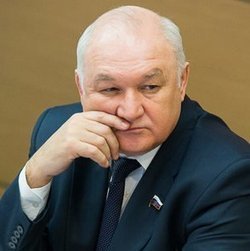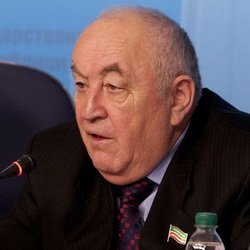“The Internet is a good thing, but there's Columbine, simply everything is there!”
Private security companies, principals, parenting, the Internet, or the weapons bill — who's to blame for regular school shootings?
The State Duma commented on the tragedy in Blagoveshchensk, where a student with a hunting rifle opened fire, killed a person and committed suicide. Although it is not the first incident of school shooting, deputies refuse to raise the age for the right to buy a gun. Last year, after a similar tragedy in Kerch, a similar initiative was made by the State Council of Tatarstan. As Deputy of the State Duma of Russia Ildar Gilmutdinov told Realnoe Vremya newspaper, the problem can be solved by placing the responsibility for ensuring the safety of educational institutions on the founders — school principals today have no money for normal security. On the issue of poor security, Rafil Nugumanov, former deputy of the State Council of Tatarstan, police major general, agrees with him. But, in his opinion, the problem is that the National Guard of Russia, unlike the Russian ministry of internal affairs, is unable to control the circulation of weapons, and in the absence of a proper system of education, whereby students spend hours on the Internet.
Russian State Duma: private security companies and public procurement laws are to blame
A 19-year-old student of the Amur College of Construction and Housing and Communal Services staged a shooting from a registered hunting weapon on 14 November in Blagoveshchensk in Russia’s Far East. One student died. The killer committed suicide. The State Duma, commenting on the tragedy, said that the question of raising the age of sale of weapons was not on the agenda, the deputies only intend to discuss with representatives of the National Guard of Russia the issue of improving the quality of work of private security companies (PSCs) in the framework of the working group on improvement of legislation in the field of arms circulation and private security. At the same time, the deputies have already prepared a bill to improve the quality of work of PSCs (it is being under agreement). A number of people's deputies, in particular Alexander Khinshtein, pay attention to the fact that the student owned the smoothbore weapon legally, on the contrary, the private security guard of the college did not have the necessary certificate for work. The reason for this, in particular, is in the legislation on public procurement: “The principle of concluding contracts does not proceed from professional opportunities and the quality of security services, but from the price — who give less they win.” The general opinion of the deputies was expressed by Ernest Valeev, referring to the murder of a postgraduate by historian Oleg Sokolov:

There have been 14 similar cases in Russia since 2015, the most tragic — in Crimea
In connection with the shooting at the college, the mayor's office of Blagoveshchensk held an emergency meeting, where the department of education was instructed to audit the security systems in educational institutions. Inspections will be held in the institutions of additional education, libraries, sports schools and other facilities. Unfortunately, this is not the first case of Russian “Columbine”, after each of them they held emergency meetings and inspections, reprimanded and dismissed officials, but the problem still hasn’t bill solved, as well as, however, in the United States, where such school shootings occur regularly. Let us remind that in May in Kazan, a similar shooting was about to happen when a pupil of the gymnasium No. 7 passed in the establishment, as it became clear subsequently — through a cheap and badly working metal detector, with a gun and took the whole class hostage — fortunately, nobody suffered.
Since 2015 alone, according to TASS, there have been 14 incidents in Russia when people were killed or injured in secondary schools as a result of shooting from various weapons. We will note, however, that often pupils in such cases shot from a pneumatic weapon. For example, on September 5, 2017, a nine-grader of the school No. 1 in the town of Ivanteyevka brought aimprovised explosive packages, an axe and a pneumatic weapon to the educational institution: he shot from the weapon at the teacher, hit her with an axe, and blew up the pyrotechnics. Frightened, three students jumped out of the window, receiving various injuries as a result. The most resonant case occurred a year ago, when on October 17, 2018, a shooting occurred at the Kerch Polytechnic College, accompanied by the detonation of an improvised explosive device, which killed 20 and injured 65 people. In Tatarstan, in recent years, we can recall the incident in Nizhnekamsk, where in February 2017, in one of the schools, a 14-year-old student shot a pneumatic pistol in the eye of the deskmate, the child died in a hospital in Kazan.
“Safety and security at educational institutions should be entrusted to their founders!”
According to Deputy of the State Duma of Russia Ildar Gilmutdinov, the solution lies in strengthening the responsibility and safety of educational institutions themselves. In particular, in legislation that places this responsibility on school administrators, principals who try to address these issues “based on their possibilities”.
“As a result, somewhere it is PSCs, somewhere it is grandparents who guard. I think this approach should be changed. Ensuring the safety of educational institutions should be entrusted to their founders! The founders are usually either municipalities or regional and federal authorities. And the necessary financial resources to ensure certain standards and requirements should be taken from the founders. It is not the school administration that should seek how to ensure the safety,” he noted in the conversation with Realnoe Vremya.
The deputy believes that this will certainly require additional budget funds, so that the authorities at all levels have the finances to ensure a set of security measures within the framework of the approved standard provisions and standards.

Gilmutdinov: it is necessary to conduct an audit of “the arms legislation”
“If we do not change the approach, we will always have problems of defects of some private security companies or grandparents. Again they will tell that someone fails to keep an eye on something!”
Tatarstan proposed raising the age at which citizens have the right to purchase weapons already a year ago, the deputy reminded. Then the speaker of the Tatarstan State Council just after the Crimean tragedy said: “The events in the city of Kerch have not left anyone indifferent. Therefore, we have proposed to introduce restrictive measures on the sale, storage and use of weapons.” The main change that Tatarstan parliamentarians proposed to make to the federal legislation is to raise the age at which citizens have the right to purchase weapons, from 18 to 21 years. That didn't happen. According to Gilmutdinov, today it is necessary at least to audit the legislation regulating access to weapons. For this purpose, to create a working group of deputies in the State Duma.
Rafil Nugumanov: National Guard of Russia is unable to control the circulation of weapons
Rafil Nugumanov, police major general, member of the Tatarstan government commission on crime prevention and member of the board of the ministry of youth affairs of the Republic of Tatarstan, in an interview with the correspondent of Realnoe Vremya noted with regret that there is no single unambiguous recipe for solving this problem, although the control of weapons, he believes, should be tightened in any case:

In his opinion, the age at which citizens have the right to purchase weapons, still worth raising-up to 20 years. The army here, he believes, is not an argument. Yes, 18-year-olds are trusted with weapons there, but, according to Police Major General Nugumanov, there is the control by commanders. However, the commanders in the army are not always able to control the behaviour of young soldiers carrying weapons. Let us remind, just a couple of weeks ago in the military unit in Zabakailye, because of, presumably, hazing, Tatarstan citizen Ramil Shamsutdinov shot eight people with a machine gun. Rafil Nugumanov, commenting on the tragedy in Blagoveshchensk, noted that today's education system is built in such a way that most teachers are primarily engaged in teaching children, and the Soviet experience with class teachers who can tell about each student “what his parents are, what and how, normal or not” has been forgotten.
“The Internet is a good thing, no questions, but there's Columbine, simply everything is there!”
“We should also remember about security. If in Blagoveshchensk or Kerch, there were normal security guards, then how murderers could pass through them with a weapon?! That means that the guards were bad. You one starts to look at why the security was bad, most likely, it will turn out that there was simply no money for security! In the best case, they collect money from parents, and an old woman sits at the entrance. In Israel, the guards sit with guns there... We need to allocate normal funds for the security of educational institutions, so that their management could hire a normal private security company. We have good security companies today, with weapons and specialists,” said the former deputy of the State Council of the Republic of Tatarstan.
Rafil Nugumanov also notes the shortcomings in today's system of education. If in Soviet times, students were occupied and entertained, there were Little Octobrists, pioneers, Komsomol. Now many young people often spend their time online. In the Internet itself, he actually sees nothing bad (“we also sit on the Internet”), but the Network actually replaces the reality for students.
“No questions, the Internet is a good thing. But there's also Columbine, simply everything is there! And children eventually want to show themselves... It is abnormal for a young 15-16-year-old boy to spend six to eight hours online.”